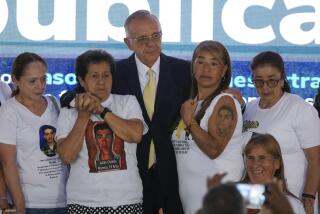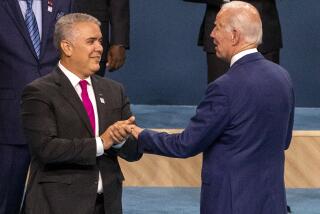COLOMBIA : Ex-Enemies Find Common Goal
- Share via
MONTERIA, Colombia — They are perhaps the oddest couple in Colombia’s struggle to end three decades of guerrilla violence.
From the extreme left comes Rafael Kerguelen, a Marxist who spent 15 of his 35 years in the People’s Liberation Army and rose to command 450 guerrillas in the rural northern Department of Cordoba.
And from the far right: Rodrigo Garcia, 65, president of the Cordoba Cattlemen’s Federation, who sponsored paramilitary defense squads after Kerguelen’s men burned his ranch for evasion of a “war tax.”
Last October, just seven months after the guerrillas laid down their arms, the two men joined forces against the ruling Liberal Party in national elections--Kerguelen running for the Senate, Garcia for governor. Their ticket lost, but the once-bitter enemies are still working to reconcile one of the country’s poorest and most violent regions.
President Cesar Gaviria and his predecessor are credited with initiating peace talks that led to the disarmament of 3,292 guerrillas across Colombia in the last two years. But in separate interviews here, the cattleman and the ex-commander charged that their own peacekeeping effort is being frustrated by local authorities.
“We have something worse than guerrillas now; we have bad government,” Garcia said. “Economically, this region has been totally forgotten. . . . I believe more in the good will of the former guerrillas than in the government’s capacity to consolidate the peace.”
Under the peace accords with four rebel groups, the government was to help set up companies to employ former rebels. But Kerguelen accuses local bureaucrats of delaying the start-up of farming, ranching and water purification enterprises for 350 of his followers. Meanwhile, nine of those disarmed rebels have been killed by paramilitary squads. Idled and threatened, others have turned to crime. Thirty have resumed the armed struggle.
Such setbacks have complicated peace talks with commanders of the 7,000 fighters in Colombia’s two remaining leftist guerrilla groups, who argue that the pacification program is failing.
“We want to make Cordoba a model of reconciliation,” said Kerguelen, whose movement has renamed itself Hope, Peace and Liberty. “But standing in our way are functionaries who don’t understand that war is more costly than peace.”
He now considers it an “error” to have targeted cattlemen during the war instead of “the real culprits, who steal the people’s tax money.”
By Garcia’s count, guerrillas stole 25,000 head of cattle in Cordoba during the late 1980s and killed 220 cattlemen, including two of his employees during the November, 1988, raid on his ranch.
Other ranchers opposed Garcia’s postwar alliance with the guerrillas who had tormented them. “But I thought it was worth the risk,” Garcia said. “If I had succumbed to the instinct for revenge, the killing would never stop.”
More to Read
Sign up for Essential California
The most important California stories and recommendations in your inbox every morning.
You may occasionally receive promotional content from the Los Angeles Times.













